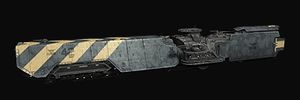Ship Frigate USN Ranger
| Ranger | |
|---|---|
 Ranger | |
| Type | Frigate |
| Combat role | Carrier |
| Service | |
| Used by | United Space Navy |
| Wars | Second Antarean War |
| Specifications | |
| Length | 570m |
| Fighter bay |
1x Assault craft 1x Bombers 1x Strike craft 2x Fighters 2x Interceptors |
Main armament |
1x Medium ion cannon 1x Heavy missile launcher 2x Railcannon 4x Medium plasma turret |
| Statistics | |
| Hull | 192100 points |
| Armour | 39350 points |
| System stations | 8 stations |
| Boost time | 25s |
| Max thrust | 600 |
Before the cataclysm of the Great Betrayal, the United Space Navy was looking for a craft to replace the outdated and largely ineffective Alfazard class frigate. In the spirit of galactic cooperation, rival shipyards from Mournecreek, Cinnabar, and Polaris collaborated to develop the Ranger.
First produced at the USN's proprietary Pleides Fleetyards, the Ranger did not see action in any broad sense until the opening months of the Antarean War. Sporting a sleek profile and powered by a massive VA-Arcam plasma engine, the frigate is one of the meanest additions to the USN's arsenal.
Favoring the design strengths of all three super-powers, the Ranger is capable of launching and supporting a squadron of experimental Katana class fighters and the new Demolisher Assault Mecha. In addition, its ECM and counter-missile strength extends the frigate's sphere of coverage far wider than that of its predecessor, the Alfazard. Usually found in the company of larger vessels, these features make it an incredibly valuable part of any defensive screen, as well as allowing the ship to operate unsupported for extended periods of time (it has become a standard USN practice to garrison out-of-the-way worlds with only a single squadron of Rangers, as they have proven both efficient and effective at handling in-system defense).
The Ranger has its weaknesses. Due to design and technological constraints, the craft's orientation and design lend it certain "blind spots" that small attack craft can take advantage of. Most notorious is a disk that extends from the front to the rear of the craft where the main-guns cannot orient to fire. Known in spacers lingo as a "Deadzone", it leaves the Ranger vulnerable to smaller craft, like fighters and assault-ships, should they manage to close quickly enough. To counter this, weapons are concentrated along the "spine" of the ship as well as dotting each axial line. This arrangement provides for layered concentrations of firepower, and overall have statistically increased the ship's combat-performance. Still, the danger to the craft still exists.
Designed from the deck up to incorporate the latest technology, the Ranger is a jack of all trades. four forward mounted Ackerson-99X anti-ship torpedo tubes provide the Ranger with enough long-range punch to make it a threat to larger ships. Sporting an even spread of short-range missile batteries, counter-missile clusters, and medium-range ion-arrays, and backed by the massive firepower of two Morgansen Vengeance class repeating railcannons, the Ranger is capable of threatening craft several orders for magnitude larger than itself. With an impressive sub-light speed, the Ranger is capable of handling a bevy of tasks, from system defense to commerce raiding. Supported by next-generation hardware, this is one ship that has proven time and time again to be more than a match for the technological improvements of the AISN.
Historical Note: The first of the Ranger class were built from experimental designs and were rushed into service well before the regular R&D; phase had completed (in order to help suppress the growing strength of the Crusaders). Since much of the technology planned for inclusion was not easily fabricated at the time, many parts were adapted from existing designs, leading to an overall decrease in the ship's speed and destructive power. Thus, the ships built originally were only capable of mounting twelve torpedo launchers instead of sixteen. However, the end of the Crusader Rebellion allowed the planned breakthroughs in micronization and design to be applied to the Ranger and were later reintegrated into the ship schematics (by swapping the original plasma generators with smaller, lighter replacements). As a result, the additional four torpedo tubes were added, as well as various other weapons and subsystems.
Known ships:
- USNV Yoshiro
- USNV Auger of Fate
- UNSV Legion
| ||||||||||||||||||